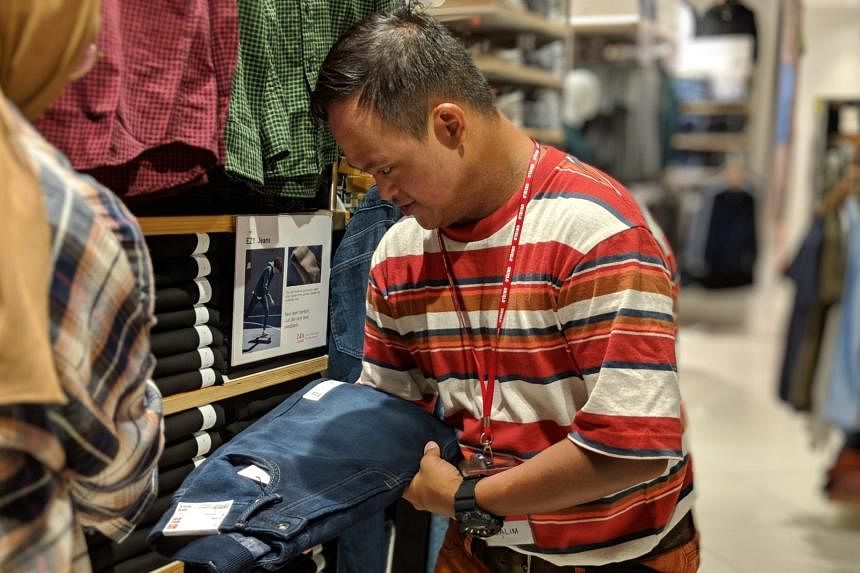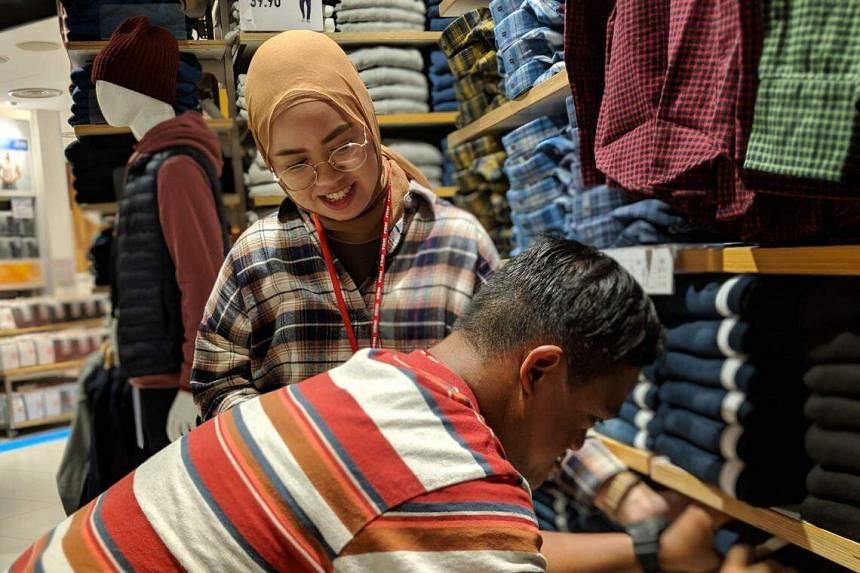
Apparel retailer Uniqlo currently employs 42 people with disabilities across its 28 stores in Singapore.
PHOTO: UNIQLO SINGAPORE
Syarafana Shafeeq
UPDATED
MAR 7, 2023
SINGAPORE – With the news that an Enabling Business Hub will be opened later this year to encourage inclusive hiring practices and job placements for persons with disabilities (PWDs), employers here have even more reason to step up inclusive hiring.
The hub will be launched in Jurong West in the second half of 2023, to bring jobs closer to where PWDs live.
But some companies have already made the first move to hire PWDs, before the latest measures were announced during the debate on the Ministry of Social and Family Development’s budget last Friday.
For example, logistics giant Amazon has partnered with SG Enable, a disability services and support organisation in Singapore, to hire around 20 PWDs across its operations facilities.
An Amazon spokesman said the company’s staff have given positive feedback, citing how inclusive hiring helps them develop stronger empathy and creates a more cohesive workforce.
In February, the company pledged to triple its hiring of employees with disabilities for operations facilities in the next three years.
It made the commitment after signing a memorandum of understanding with SG Enable.
Apparel retailer Uniqlo currently employs 42 people with disabilities across its 28 stores in Singapore.
Uniqlo Singapore human resource director Juliana Tan said the company works very closely with job coaches from Minds Hi-Job! to understand each employee’s profile and way of communication.
Minds Hi-Job!, a programme under the Movement for the Intellectually Disabled of Singapore (Minds), is a job placement and support programme to help those with special needs seek employment opportunities.
Ms Tan said Uniqlo’s employees work under a buddy system. This means that employees with disabilities work alongside fellow non-PWD employees, and receive support as they adapt to the new environment.
They start off by working in the storeroom – a role that does not require them to interact with customers – in order to ease themselves into their roles, she added.
MORE ON THIS TOPIC
More interest in hiring people with disabilities in sectors facing manpower crunch
More coordinated and inclusive support – but will S’pore employers and society bite?
Assigned tasks are broken down into simpler steps for them to learn better.
PWD employees are assessed based on their performance and comfort level, and assigned new tasks accordingly, said Ms Tan.
Some of the tasks, similar to that done by employees without disabilities, include product unpacking and replenishment, and ensuring that the stores are kept clean and tidy. Those who are comfortable with these roles can also be trained for fitting room duties, where they take stocks to the sales floor.
Ms Tan said: “As with all employees, we focus on each person’s strengths and interests during training, and assign tasks in stores to maximise these capabilities.”
She added that while employees with disabilities may need a bit more time to get used to their scope of work, the company has observed that they are very meticulous in their work once they are familiar with the assigned tasks.
“Their passion towards the work they do also motivates people around them, which is beneficial for the team.”
At the same time, the team also makes sure to pay special attention to employees with disabilities’ emotional needs, to ensure that their experience is a fulfilling and meaningful one, she said.
“For example, as a company, we encourage all team members to be patient in communicating with each other. Staff are also encouraged to write ‘thank you’ cards to each other, which serve to motivate and bond the team.”

Syarafana Shafeeq
UPDATED
MAR 7, 2023
SINGAPORE – With the news that an Enabling Business Hub will be opened later this year to encourage inclusive hiring practices and job placements for persons with disabilities (PWDs), employers here have even more reason to step up inclusive hiring.
The hub will be launched in Jurong West in the second half of 2023, to bring jobs closer to where PWDs live.
But some companies have already made the first move to hire PWDs, before the latest measures were announced during the debate on the Ministry of Social and Family Development’s budget last Friday.
For example, logistics giant Amazon has partnered with SG Enable, a disability services and support organisation in Singapore, to hire around 20 PWDs across its operations facilities.
An Amazon spokesman said the company’s staff have given positive feedback, citing how inclusive hiring helps them develop stronger empathy and creates a more cohesive workforce.
In February, the company pledged to triple its hiring of employees with disabilities for operations facilities in the next three years.
It made the commitment after signing a memorandum of understanding with SG Enable.
Apparel retailer Uniqlo currently employs 42 people with disabilities across its 28 stores in Singapore.
Uniqlo Singapore human resource director Juliana Tan said the company works very closely with job coaches from Minds Hi-Job! to understand each employee’s profile and way of communication.
Minds Hi-Job!, a programme under the Movement for the Intellectually Disabled of Singapore (Minds), is a job placement and support programme to help those with special needs seek employment opportunities.
Ms Tan said Uniqlo’s employees work under a buddy system. This means that employees with disabilities work alongside fellow non-PWD employees, and receive support as they adapt to the new environment.
They start off by working in the storeroom – a role that does not require them to interact with customers – in order to ease themselves into their roles, she added.
More interest in hiring people with disabilities in sectors facing manpower crunch
More coordinated and inclusive support – but will S’pore employers and society bite?
Assigned tasks are broken down into simpler steps for them to learn better.
PWD employees are assessed based on their performance and comfort level, and assigned new tasks accordingly, said Ms Tan.
Some of the tasks, similar to that done by employees without disabilities, include product unpacking and replenishment, and ensuring that the stores are kept clean and tidy. Those who are comfortable with these roles can also be trained for fitting room duties, where they take stocks to the sales floor.
Ms Tan said: “As with all employees, we focus on each person’s strengths and interests during training, and assign tasks in stores to maximise these capabilities.”
She added that while employees with disabilities may need a bit more time to get used to their scope of work, the company has observed that they are very meticulous in their work once they are familiar with the assigned tasks.
“Their passion towards the work they do also motivates people around them, which is beneficial for the team.”
At the same time, the team also makes sure to pay special attention to employees with disabilities’ emotional needs, to ensure that their experience is a fulfilling and meaningful one, she said.
“For example, as a company, we encourage all team members to be patient in communicating with each other. Staff are also encouraged to write ‘thank you’ cards to each other, which serve to motivate and bond the team.”

Assigned tasks are also broken down into simpler steps for them to learn better.
PHOTO: UNIQLO SINGAPORE
Ms Tan said the company has a worldwide goal to hire the equivalent of at least one PWD per store.
This achieves two things: It enables PWDs to interact with other team members and achieve an independent life, while encouraging greater awareness, patience and inclusivity towards the PWD community.
Earlier in 2017, Uniqlo set up a training classroom at APSN Delta Senior School in Choa Chu Kang, used mostly by students who are in their final year of a retail operations programme.
The classroom provides a platform for students with special needs to build their knowledge and skills in fashion retailing, and prepares them for a smoother integration into the workforce.
Mr Paul Heng, managing director of NeXT Career Consulting Group, said more can be done to encourage inclusive hiring of PWDs.
He said employers may not be so motivated to hire them out of fear that they do not have the necessary skill sets for the job. They may also be worried about having to incur additional expenses, for example, reconfiguring the workplace to accommodate employees who are not mobile.
“It’s a mindset issue... PwDs have been viewed differently, both at the workplace as well as society in general,” said Mr Heng.
“Employers can, and must, do their part. I understand companies are in the business of making money, but if we really are serious about becoming an inclusive and developed country, we must behave like one, as one people.”
Ms Tan said the company has a worldwide goal to hire the equivalent of at least one PWD per store.
This achieves two things: It enables PWDs to interact with other team members and achieve an independent life, while encouraging greater awareness, patience and inclusivity towards the PWD community.
Earlier in 2017, Uniqlo set up a training classroom at APSN Delta Senior School in Choa Chu Kang, used mostly by students who are in their final year of a retail operations programme.
The classroom provides a platform for students with special needs to build their knowledge and skills in fashion retailing, and prepares them for a smoother integration into the workforce.
Mr Paul Heng, managing director of NeXT Career Consulting Group, said more can be done to encourage inclusive hiring of PWDs.
He said employers may not be so motivated to hire them out of fear that they do not have the necessary skill sets for the job. They may also be worried about having to incur additional expenses, for example, reconfiguring the workplace to accommodate employees who are not mobile.
“It’s a mindset issue... PwDs have been viewed differently, both at the workplace as well as society in general,” said Mr Heng.
“Employers can, and must, do their part. I understand companies are in the business of making money, but if we really are serious about becoming an inclusive and developed country, we must behave like one, as one people.”
No comments:
Post a Comment